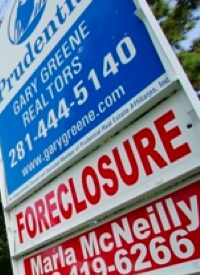
The rich as well as the poor are losing their homes to foreclosures. That fact helps demonstrate the vast silliness of the federal government helping those low-income Americans who are not creditworthy to get home loans. The poor and middle class in America have long had the ability to save up for a modest down payment and then to make equally modest mortgage payments. Older Americans, many of whom purchased three-bedroom, one-bath homes in pleasant but unassuming neighborhoods, have enjoyed all the benefits of homeownership without the federal government demanding that the rules of financial soundness be met.
Moreover, banks and home loan associations have been able to make a profit with low-end mortgages to hard-working Americans who were not rich. The intention and the ability to make mortgage payments, not the wealth of the borrower, have always been prime factors in the prudence of mortgages and other loans. When government encourages lenders to make irresponsible loans, those borrowers who qualify under ordinary guidelines of fiscal soundness suffer too. Foreclosures drive down the market values of homes, much like the printing of fiat (unbacked) dollars drives down the purchasing power of money.
So it should come as no surprise that news stories are beginning to expose the foreclosure rates in very affluent areas like Silicon Valley or North Lakeshore Drive in Chicago.
According to the New York Times story entitled “Biggest Defaulters on Mortgages Are the Rich,” one in seven homes with a mortgage of one million dollars or more has delinquent mortgage payments while “only” one in 12 mortgages below one million dollars is delinquent. That suggests that a disproportionately large number of wealthy Americans are losing their homes.
However true that may be, it is undeniable that foreclosures are hitting some of the most exclusive neighborhoods in the nation, and many homeowners in those neighborhoods seem to be “in denial” as the New York Times called them. Sometimes these homes are second residences, intended not only for living but also as an investment in a housing market that would always move homes into higher price brackets.
The pain of the wealthy is bad news for the middle class and the poor. Dropping property values in a housing market does not just hurt one income level. All suffer. High foreclosure rates are also very bad news for banks. Houses sold at foreclosure sales almost never come close to covering the lost mortgage payments from a defaulting loan. When banks have less money to loan on sound investment, business suffers as well — and the more expensive the home foreclosed upon, the less money for local businesses.
If there are solution to this “crisis”? Yes: Let the market operate freely. Banks, savings & loan associations, and similar institutions have a profound vested interest not only in the repayment of their mortgages but also in the general economic health of the community in which they do business. Government lacks the knowledge, the motivation, and the flexibility to adapt changes in economic climate. Politicians are in the housing business for votes, for power, and for graft — none of which reflect sound business.
Photo: AP Images



